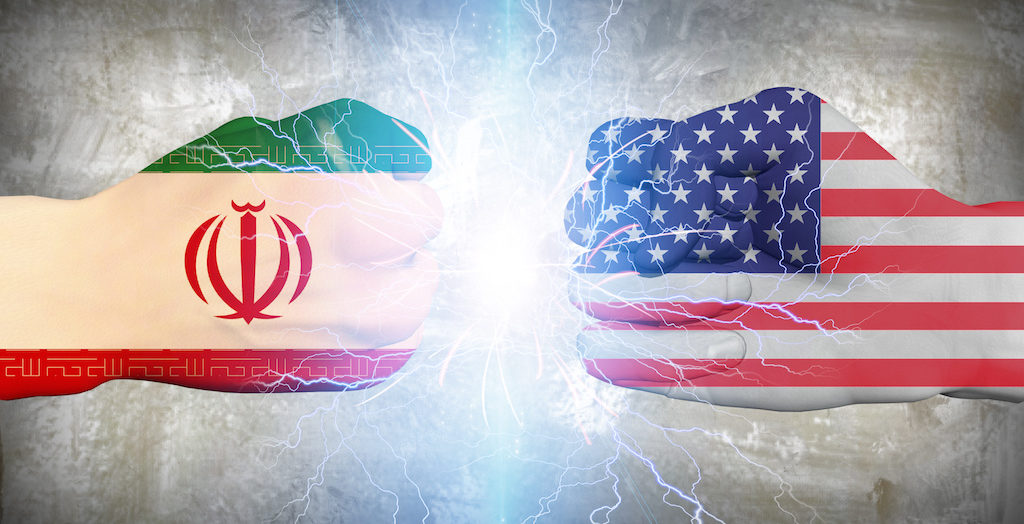The U.S. war drums are beating loud and clear and this time Iran is in the crosshairs. Its military reinforcement in the Gulf region indicates that a possible confrontation is impending. The U.S. already deployed warships and planes to the Gulf region and has ordered for the departure of “non-emergency employees” from Iraq, citing intelligence about a potential threat to U.S. forces by Iran. It blames the latter of the tanker bombings, drone attacks on vital Saudi facilities, rocket attacks in Iraq. And now it has provoked Iran by flying over Iran’s territorial airspace with a U.S. Navy drone RQ-4A Global Hawk, upon which Iran’s Revolutionary Guard shot down the U.S. surveillance drone.
Even though the U.S. is noticeably engaged in a confrontational and challenging discourse, the statements however, of both U.S. and Iranian officials shows another picture. The overall tone of the statements in regards to Iran are more balanced, intended to ease tensions instead of escalate the situation. Both expressed on several occasions that they do not seek to engage in a war. Also, Iran’s shooting of a U.S. Navy drone was dealt according this template. President Donald Trump, not only withdrew his order to retaliate, he even downplayed the downing of a U.S. drone by Iran by stating: “I have a feeling it was a mistake made by someone who shouldn’t have been doing that.” and “I find it hard to believe it was intentional.”
Also, the size of the current military pileup in the region confirms this uproarious policy. Simply because in its current shape it is not at all suitable for a confrontational war with Iran.
If we would scratch a little bit more on the surface of the U.S.-Iran relationship, especially of the past half century and we go beyond the back and forth mud throwing we can see two states who never had a war between them, despite the strong war rhetoric. Whereas, Iran’s neighbouring countries on its East as well on its West were brutally invaded by the U.S. Moreover, the invasion of neighbouring Afghanistan and Iraq were possible exactly due to Iran’s cooperation with the occupier where it utilized its resources in favour of the Americans. And more recently, when the regime of the tyrant Bashar al Assad was on the verge of collapse, the U.S. lifted the sanctions against it and gave green light to Iran to deploy its military forces in order to rescue the crumpling Assad regime against the Muslims.
So, a confrontational war with Iran, considering the above mentioned, seems not plausible and if there would occur a military strike, it would be on specific strategic targets.
The main reason behind this “one’s bark is worse than one’s bite” U.S.-Iran relationship policy is to create a scarecrow for the region and beyond.
For the region, the U.S. keeps alive the Sunni-Shia conflict. Where Iran is portrayed as a threat in order to form a U.S.-Arab coalition including the Jewish entity against it. With the purpose to normalise the “Israeli” existence in the region and to shift the focus of the “Israeli” occupation and aggression towards a sectarian conflict in the region with Iran. And not to forget, to form a first-hand regional power against any upcoming Khilafah state (Caliphate) in the region.
For the Western world, the U.S. is using Iran’s nuclear ambition and the production of low-enriched uranium as a threat. Trump unitarily pulled back out of the Iran nuclear deal, the Joint Comprehensive Plan of Action (JCPOA), which was reached between the U.S., Iran, the UK, Russia, France, China, Germany and the EU in July 2015. Trump criticised the JCPOA and called it “disastrous” and “one-sided” and that it will “cause havoc within the Middle East and beyond”. Then he imposed sanctions on financial transactions related to U.S. dollars, Iran’s automotive sector, the purchase of commercial planes, metals including gold, Iranian oil sector and central bank. These sanctions were aimed at imposing “maximum economic pressure” on Iran in order to force it in to a new nuclear agreement with the U.S. on Trump’s terms without the members of JCPOA. So, it can exclude the members of the JCPOA of the benefits of a new nuclear deal and pave away exclusive opportunities for American companies in the Iranian market.
For domestic policy, Trump is using the Iranian threat, as a means to back down the attempts of the Congress to block the arms sales to Saudi Arabia.
And lastly, the U.S. will benefit tremendously of the conflict with Iran and Venezuela, both big exporters of oil. It sanctioned them to export oil, which as a result will cause the oil prices to increase worldwide. Whereas the U.S. will still buy its cheap oil from the traitors of the Gulf region and produce its own largescale shale oil domestically so it can be an important exporter of oil to the world.
Okay Pala
Media Representative of Hizb ut Tahrir in The Netherlands

